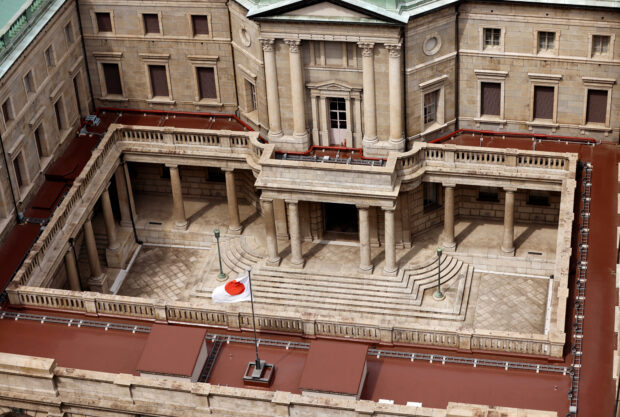Bank of Japan expected to end negative rates

FILE PHOTO: Japanese national flag is hoisted atop the headquarters of Bank of Japan in Tokyo, Japan September 20, 2023. REUTERS/Issei Kato/File Photo
Tokyo, Japan — The Bank of Japan is widely expected to scrap its maverick negative interest rate policy on Tuesday and hike borrowing costs for the first time in 17 years, according to economists and media reports.
The US Federal Reserve and other central banks yanked up rates to rein in galloping inflation after Russia’s 2022 invasion of Ukraine.
READ: BOJ to scrap negative interest rates in April, say over 80% of economists
But haunted by the country’s “lost decades” of stagnation and deflation, the BoJ kept its main rate negative, as it has been since 2016. The last hike was in 2007.
Because this means banks lose by parking capital with the BoJ, they are encouraged to lend to businesses and thereby jump-start the economy and inflation.
The BoJ has also spent vast amounts buying up bonds and other assets to pump liquidity into the financial system.
READ: Dollar steady, yen wavers as BOJ policy shift beckons
The negative interest rate policy has helped keep a lid on the cost of servicing Japan’s debt, which at around 260 percent of national output is one of the world’s highest.
But it has sharply weakened the yen against the dollar, which is good news for exporters but unwelcome for consumers as it has made imports more expensive.
‘Virtuous cycle’
Inflation has, in fact, been at or over the BoJ’s target of two percent for almost two years.
But despite some tweaks around the edges — such as more flexibility with regard to its target range for bond yields — the main interest rate remains at minus 0.1 percent.
This is because the BoJ wants more evidence of a “virtuous cycle” of rising wages and inflation driven by demand.
The final piece of the jigsaw may have come on Friday when Japan’s largest trade union secured a wage hike of 5.3 percent from employers, the most since 1991.
Stefan Angrick at Moody’s Analytics said Monday that the BoJ was “almost certain to drop its negative policy rate on Tuesday” after the wage talks.
“Japan’s in the ballpark of what’s needed to sustain two percent inflation domestically,” Angrick said, and the wage result means “the BoJ will likely throw caution to the wind and move now”.
Some 67 percent of surveyed economists predict that the policy rate setting will be hiked to between zero and 0.1 percent, according to Bloomberg.
BOJ officials are also considering ending their purchasing of exchange-traded funds and real estate investment funds, though they will continue to buy government debt, according to people familiar with the matter, Bloomberg reported.
But moving too aggressively could also see large volumes of capital attracted to Japanese assets, potentially destabilizing financial markets.